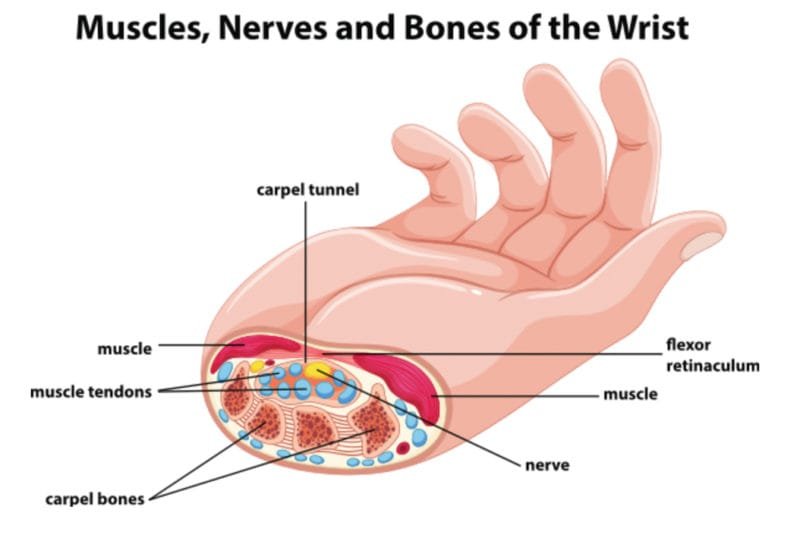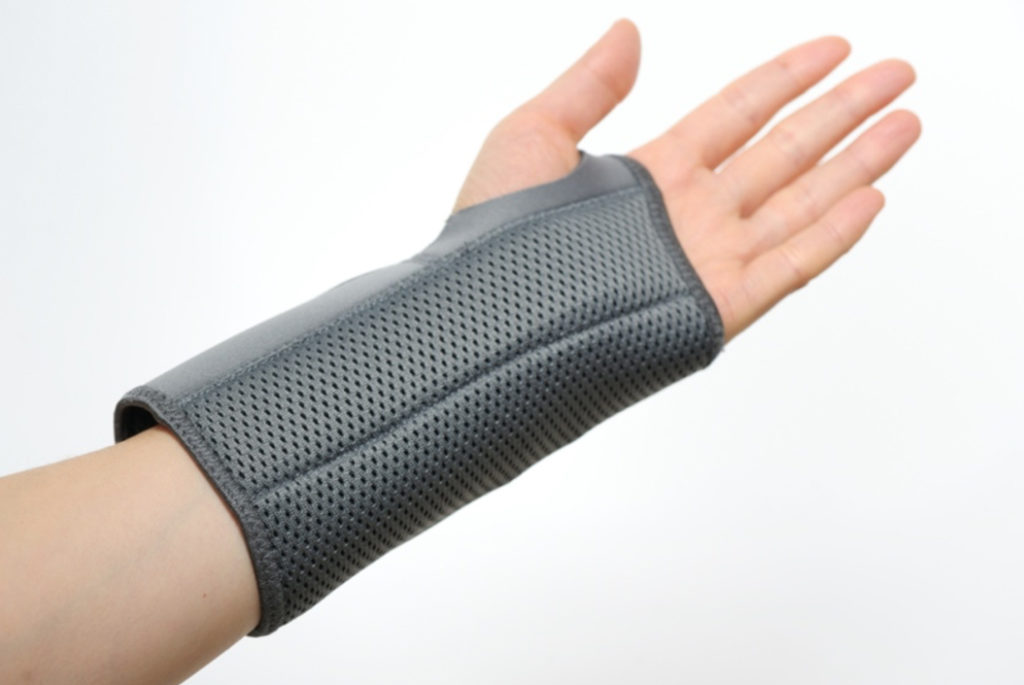What is carpal tunnel syndrome (CTS)?
Carpal tunnel syndrome is a painful, debilitating condition that can significantly affect your ability to perform simple daily activities such as gripping and can cause significant night pain and discomfort. It is caused by pressure on the median nerve, which is located on the inside of the wrist. It is common in women during pregnancy and postpartum, in those who are involved in manual tasks such as builders, and those who spend long hours at the computer with a poor ergonomic set-up and posture. It can also be related to other medical conditions such as diabetes and thyroid problems e.g. hypothyroidism.
The treatment of carpal tunnel syndrome varies depending on the exact cause of your issue. Physiotherapy, activity modification and anti-inflammatories can provide some symptomatic relief from your pain. A wrist splint can be useful, particularly at night, to relieve the pressure on the nerve by keeping your wrist in a neutral position. We would recommend you trial a wrist splint at night for 4 weeks as a minimum to reduce your symptoms. However, if your symptoms do not improve, we recommend an ultrasound guided steroid injection to help relieve the pressure on the nerve. We always recommend a steroid injection before considering surgical intervention, as many surgeries can be avoided.
What are the symptoms of carpal tunnel syndrome?
The symptoms of carpal tunnel syndrome are:
- Achy pain in your fingers and hands, particularly the pad of the thumb, index and middle finger
- Pins and needles and numbness in the hand, which makes you want to shake your hand to relieve the symptoms
- Weakness and difficulty gripping
If this sounds like your pain, read on below…
What other conditions can mimic carpal tunnel syndrome?
If this does not sound like your pain there are other conditions that can mimic the pain of carpal tunnel syndrome such as:
- Osteoarthritis of the wrist
- DeQuervain’s tenosynovitis
- Osteoarthritis of the thumb
- Triangular fibrocartilage complex (TFCC) tear
- Scapholunate ligament injury
Carpal tunnel syndrome vs osteoarthritis (OA) of the wrist
The main difference is that carpal tunnel syndrome is a compression of the nerve, so you experience pins and needles and weakness of the hand, whereas Osteoarthritis of the wrist effects the joint, so you do not experience these nerve related symptoms. Wrist Osteoarthritis causes thickening and swelling of the wrist joint with associated pain and stiffness, carpal tunnel syndrome is not associated with significant stiffness and swelling at the wrist joint.
If you are unsure whether an injection is right for you, we are happy to organise a complimentary phone call with one of our clinicians – Click here to book now
Anatomy
Carpal tunnel syndrome (also known as CTS) is a common condition which affects up to 16% of the UK. Women are three times more likely than men to develop carpal tunnel syndrome. It is a common condition in new mums, manual workers e.g. builders and bricklayers and those who spend a long time at their desk.
Carpal tunnel syndrome is a condition which can cause pain, pins and needles and numbness (reduced/altered sensation) in the wrist and hand. These symptoms are normally felt in the distribution seen in the image below. Symptoms are often worse at night, first thing in the morning or with prolonged computer use/activity.

Carpal tunnel syndrome can also cause weakness in your hand and wrist and a restriction in range of movement. With more severe or long term/chronic cases you can also get muscle wasting in the hand particularly the ‘pad’ of the thumb, known as the thenar eminence.
What is the Carpal Tunnel?
The carpal tunnel is a space or canal in the wrist (see image below). It is a small space with many anatomical structures. More specifically, it contains nine tendons and the median nerve. The median nerve is one of three nerves in the forearm and is the main structure involved in carpal tunnel syndrome.

What causes Carpal Tunnel Syndrome?
The median nerve runs through the carpal tunnel and is prone to irritation. Excessive use of the wrist and more specifically the flexor tendons in the carpal tunnel can cause inflammation and swelling of the medial nerve. There is also a ligament that crosses over the top of the tunnel called the transverse ligament and this can become thickened, placing more pressure on the nerve.
The risk of developing carpal tunnel syndrome is not confined to people in a single job role or lifestyle.
Research looking into what causes CTS is still ongoing.
A thorough assessment can generally give you an idea of possible causes. Causes can include:
- Heavy demand or overuse of the wrists
- Diabetes
- Arthritis of the wrist
- Injury to the wrist
- Hormonal changes
- Pregnancy
- Underactive thyroid glands
- Medications
Early diagnosis and treatment are important to avoid permanent damage to the median nerve
How do you diagnose Carpal Tunnel Syndrome?
A thorough assessment and physical examination will determine a diagnosis as well as cause. This will be carried out by one of our expert clinicians who are all very experienced in this condition.
We will also carry out a diagnostic ultrasound scan to visualise the median nerve. Carpal tunnel syndrome causes swelling of the median nerve. The increase in size of the nerve can be seen clearly on ultrasound and can be easily compared to your other side to help confirm the diagnosis. Ultrasound is as accurate as nerve conduction studies for the diagnosis of carpal tunnel syndrome. This will be carried out in your appointment time and there is no extra charge.
It is also important to rule out other conditions that can mimic the symptoms of carpal tunnel syndrome. One of the most common conditions to mimic the symptoms is referral from the neck. Issues in the neck such as a disc problem can cause compression of a nerve resulting in pain, pins and needles and numbness in the wrist and hand.

How do you treat Carpal tunnel Syndrome?
A personalised treatment plan may include an ultrasound-guided injection, tailored physiotherapy and advice on lifestyle changes. This will depend on the severity of your condition and what treatments you have tried before.
We will also look into contributing factors such as your posture and working environment.
If your symptoms have started as a result of prolonged sitting at a desk, we would advise you get a workstation assessment.
Excessive laptop use is one of the main reasons we see for the development of this condition
Other non-surgical treatments include over-the-counter drugs and prescription medicines.
We may also advise a 2 week trial of wrist splints (see image below). We suggest that patients wear the splint at night only, to see if this improves their symptoms. The splint keeps the nerve in a neutral position, providing ‘space’ in the carpal tunnel. This may give the nerve adequate time for the inflammation to settle down and symptoms to reduce. Splints can be purchased from most pharmacists.

Are steroid injections effective for Carpal Tunnel Syndrome?
Our assessment also includes an ultrasound scan of the median nerve which may highlight if there is any thickening or structural issues. This will help us determine if an ultrasound-guided steroid injection is likely to be helpful.
Ultrasound-guided injections can be very effective for the treatment of carpal tunnel syndrome.
Corticosteroid (also known as steroid) is injected next to the nerve in the carpal tunnel using ultrasound guidance. This provides high precision, maximising the effectiveness, consequently reducing complications and side effects. Using ultrasound guidance also reduces the pain associated with the procedure. Corticosteroid is a strong anti-inflammatory medicine. Steroid is the most commonly used treatments in diagnosis, treatment and prevention of injuries. Cortisone is a powerful anti-inflammatory; it is extremely safe. Ultrasound-guided injections are a well-practised procedure here at Complete Injections.
Steroid injections are recommended for carpal tunnel syndrome by the National Institute for Health & Care excellence (NICE).
The American Academy of Orthopaedic Surgeons and the College of Occupational and Environmental Medicine found strong evidence in support of the use of steroid injections to improve pain and function in patients with carpal tunnel syndrome. This evidence was in patients with acute (less than 6 weeks ), sub-acute (6 weeks to 12 weeks) and chronic (> 12 weeks) symptoms. (These recommendations can be found here.)
How many steroid injections can you have for Carpal Tunnel Syndrome?
Many of our clients have one injection and this gives them adequate pain relief. This is often combined with the use of splints and physiotherapy. However, if you have an underlying condition that is contributing to your condition such as thyroid issues, arthritis, or diabetes, you may require more than one steroid injection.
If the ultrasound scan shows a very thick, swollen nerve then you may require more than one injection to reduce the inflammation adequately.
To limit the number of injections required it is important that you address as many of the contributing factors as possible. Here are a few suggestions:
- Limit the time you spend on a lap-top or in a poor sitting position
- Have a break from computer work every 30 mins and move around
- Try using a standing desk for short periods during the day
- Carry out some simple wrist stretches at your desk every 30 minutes
- Keep fit, active and stay hydrated!

Carpal Tunnel Syndrome – Is Surgery an option?
Surgery is an option for this condition but is always reserved for the most severe cases that have not improved with conservative treatment. It is generally accepted that surgery should not be carried out unless a steroid injection has failed to improve symptoms.
There are two types of surgery for CTS, open release surgery as well as endoscopic. Both of which involve severing a ligament around the wrist to reduce pressure on the median nerve.
Although the surgery is very short (20-30 minutes), the recovery time is between 4-6 weeks and will include physiotherapy.
For more information or to make an appointment please do not hesitate to contact us on 020 7482 3875 or email us on injections@complete-physio.co.uk. If you would like to speak to one of our clinicians before booking in then just let us know.
References:
AAOS (2016) Management of carpal tunnel syndrome: evidence-based clinical practice guideline. American Academy of Orthopaedic Surgeons. www.aaos.org/
ACOEM (2011) Carpal tunnel syndrome. 3rd edition. American College of Occupational and Environmental Medicine. www.acoem.org/
If you are unsure whether an injection is right for you, we are happy to organise a complimentary phone call with one of our clinicians – Click here to book now


Leave A Comment